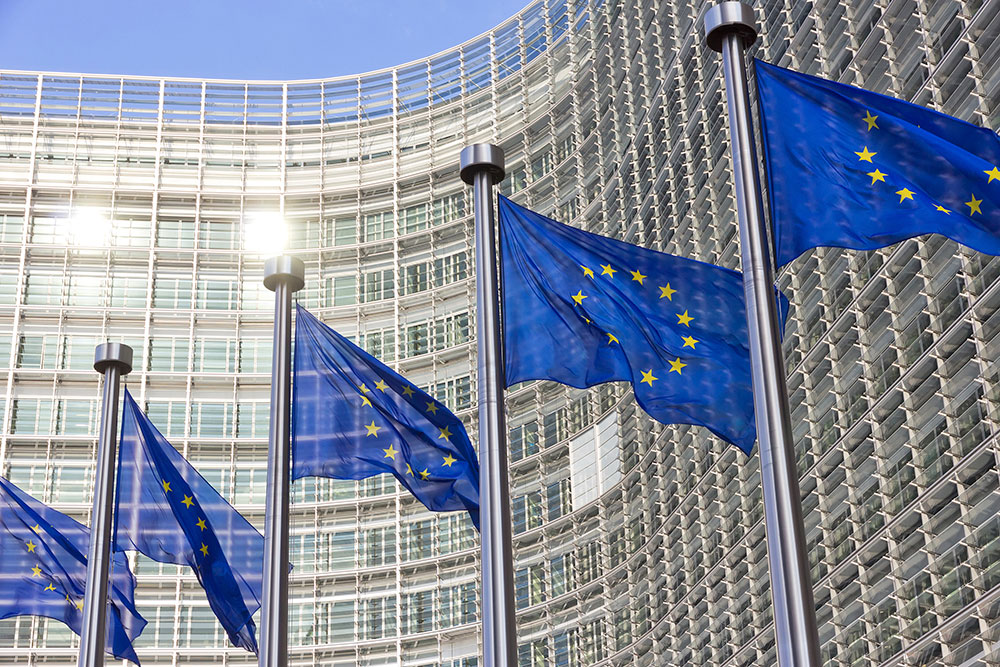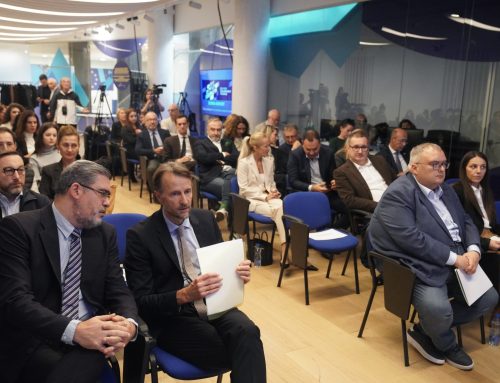The representatives of EU Member States, the Western Balkans and Turkey, as well as representatives of the central banks of the Western Balkans and Turkey, gathered today in Brussels for the annual economic policy dialogue. The meeting is part of the strengthened dialogue on economic governance between the EU and the Western Balkans and Turkey aimed at efficiently preparing the countries for the European semester[1] taking place at the EU level.
The representatives concluded the meeting with a series of country-specific targeted guidelines. The conclusions for Serbia assess the fiscal consolidation achieved in the past years as positive, noting that fiscal risks and public debt remain relatively high. Regarding the monetary policy, it is estimated that it was in line with the inflation targeting regime and that inflation was kept at a low level.
In the joint conclusions Serbia is invited to implement six recommendations: (1) target a mid-term budget balance and adopt a credible and binding fiscal rules system; (2) increase capital spending and develop a single mechanism for prioritising and monitoring all investments, regardless of the source of funding; (3) implement the remaining points of resolution of non-performing loans resolution strategy, and finalise the privatisation of the remaining state-owned banks, while continuing to promote the use of local currency; (4) increase investments in energy infrastructure and energy efficiency and finalise the unbundling and restructuring of state owned enterprises in the energy sector; (5) adopt a new industrial strategy, and ensure that all instruments of support to companies are aligned with state aid rules. Parafiscal charges need to be predictable, while a risk-based control of phytosanitary checks should be ensured; (6) reduce non-labour cost of lowest paid jobs, and increase the inclusion of unemployed into active labour market measures. All relevant actors should be involved in the roll-out of dual learning. Further attention should be devoted to tackling undeclared work.
Serbian Prime Minister Ana Brnabić said: “By firmly implementing in-depth economic reforms in the previous period, the Government of the Republic of Serbia has achieved fiscal stability and made significant progress in improving conditions for doing business. Serbia’s fiscal results have been better than planned for three years in a row, which shows how determined we are in our goal to achieve a balanced budget and a predictable fiscal policy in the medium-to-long term. Great fiscal results are followed by a responsible and predictable monetary policy of the National Bank of Serbia, which has managed to maintain a low and stable inflation rate and a stable value of dinar, and to reduce the share of non-performing loans. Leaning on the good results in the previous period, the Serbian Government has allocated a record amount of 128.2 billion dinars for capital investments in 2018. Its execution in the current year has so far exceeded the plans, but undoubtedly there is room for improvement and more effective use of available funds. One of the priorities is certainly improvement of energy stability and efficiency, regarding which I would like to stress the importance of building a gas interconnector with Bulgaria. To achieve modernisation of production technologies, we will continue working on our Industrial Strategy. We will also keep our dialogue with the business community so as to continue reducing the burden on employers and employees. By increasing a non-taxable threshold in 2018, the burden on the lowest salaries was reduced. By cooperating with businesses on retraining programmes and improving education system we will cut down unemployment and increase competitiveness of labour.”
Sem Fabrizi, the EU Ambassador to Serbia stressed that “Serbia has made important progress in implementing economic reforms, in particular in securing macroeconomic and fiscal stability. Growth is expected to be driven by private and public consumption, while investment and export performance are set to remain solid. The good economic performance should be used to create sufficient buffers against fiscal risks. There was also progress in improving the business environment, where problems such as corruption, high share of informal economy and parafiscal charges, persist. There is a need to speed-up the restructuring of large public companies, in particular in the energy sector, in order to increase their contribution to economic growth and limit their negative impact on fiscal stability. The policy guidance adopted today at the Economic and Financial Dialogue fully confirms the assessment and priorities of the 2018 European Commission Annual Report. I am happy that the Government stands firmly behind this policy guidance and actively participated in the process that led to its adoption today. I wish to stress again that the EU will continue supporting Serbia in its efforts to improve the rule of law, reform the economy and increase competitiveness, which is the focus of the Economic Reform Programme and the policy guidance. Serbia did a good and thorough job when preparing the 2018-2020 Economic Reform Programme and I look forward to the near future when the key reforms should be implemented.”
On the occasion, Governor Tabaković said: “As acknowledged by the ECB and EC, Serbia made significant progress in macroeconomic stabilisation. In such an environment, starting from 2017 we lowered the inflation target from 4% to 3%+/- 1.5 pp, and maintained inflation at a low level, which was acknowledged in the reports as well. We reduced further the key policy rate to 3%, which is its lowest level in the inflation targeting regime, thus ensuring exceptionally favourable financing conditions. The share of non-performing loans declined sharply, by 13.2 pp to 9.2%, below the pre-crisis level. The level of non-performing loans declined by 55%, which confirms that the NPL Resolution Strategy for Serbia helped recognise and eliminate the actual obstacles. The NBS has implemented all activities under its Action Plan, many of them even before the deadline. Being a responsible regulator, it even acted beyond the Strategy’s framework. This year, we expect GDP growth of at least 3.5%. Given further improvement of the business environment, favourable monetary conditions, accelerated implementation of infrastructure projects and positive labour market trends, growth will be led by investment, household consumption and exceptionally vibrant exports growth. The strong growth in exports, supported by high FDI inflows into export-oriented sectors, resulted in a more than halved share of the balance of payments deficit compared to 2012. The rise in capital investment will be Serbia’s key commitment going forward. This is confirmed by the high contribution of government investment to growth that measured 4.5% in the first quarter this year. The story about capital investment relates primarily to the implementation of infrastructure projects that serve the function of regional connectivity. I believe that in the past period we have already indisputably shown how important regional connectivity is to us. It will remain a goal to which we are committed. To embark on achieving longer-term fiscal objectives, political will was crucial. As a result – we have strong fiscal adjustment. The coordination of monetary and fiscal policies was exceptionally important – through strong monetary policy accommodation, amid fiscal policy tightening, we contributed to the solid growth in the disposable income of households. Serbia was thus an example of the country which recorded GDP growth against the backdrop of fiscal consolidation. Owing to such results, rating agencies upgraded the country’s rating and the risk premium fell to its lowest level on record for Serbia. A lot has been done, but a lot of work still lies ahead of us”.
[1] The European Semester provides a framework for the coordination of economic policies across the European Union. It allows EU countries to discuss their economic and budget plans and monitor progress at specific times throughout the year. More at https://ec.europa.eu/info/strategy/european-semester_en




